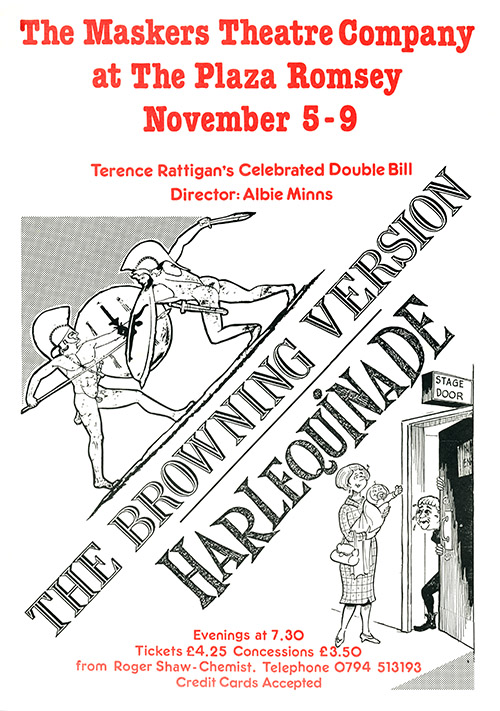Plaza Theatre, Romsey
on5th to 9th November 1991

The Browning Version and Harlequinade (Playbill as the two one-actors were called) were revived in 1980 by the National Theatre. Many of Rattigan’s most convincing plays have a boy or young man, at a testing moment of life, at the middle of them. His need in the period after Oxford to justify his choice of career to his father by becoming a success seems to have left him with what we might be inclined to call an obsession with father-son relationships. In The Browning Version there is no father and son as such; instead, as a substitute father, we have the figure of the elderly schoolmaster on the point of retirement, Andrew Crocker-Harris. Taplow, the boy, needs the approval of “the Crock” (in order to get his remove), but so does “the Crock” need the admiraton of Taplow if his entire life is not to be pronounced a failure.
Rattigan was educated in the 1920’s at Harrow School where he was a classicist. He played cricket well and played in the Eton and Harrow match at Lords. This detail is all brought forward in time to cover the period in which the play was written. His insights of the play are such that it remains timeless and will, I hazard, outlast even the system of privileged private education and the compulsory study of classics on which it is founded.
Harlequinade, the original stable mate of The Browning Version, recalls his wartime provincial touring theatre. The play is rooted in those tatty tours that brightened many a blacked-out or austerity-grey evening, and it also contains a flashback to the author’s wider graduate acting experience; but the real subject is the Coward-like one that theatrical people are a happy breed set apart from ordinary mortals in their own sealed off world, subject to a different set of motivations from the rest of us. This was the only time he ever wrote a play about actors, and Dame Maud contains more than a suggestion of Dame Sybil Thorndike. Rattigan’s gift of invention and surprise was never more fluent.
| Cast (in order of appearance) | |
| John Taplow | Matthew Bence |
| Frank Hunter | Ian Morley |
| Millie Crocker-Harris | Mollie Manns |
| Andrew Crocker-Harris | Ken Spencer |
| Dr Frobisher | David Pike |
| Peter Gilbert | Simon Wills |
| Mrs Gilbert | Maria Hutchings |
| Cast (in order of appearance) | |
| Arthur Gosport | David Bartlett |
| Edna Sely | Philippa Tayler |
| Dame Maud Gosport | Hazel Burrows |
| Jake Wakefield | Ken Hann |
| George Chudleigh | Douglas Coates |
| 1st Halberdier | Ian Morley |
| 2nd Halberdier | Neville Green |
| Miss Fishlock | Christine Baker |
| Fred Ingram | John Carrington |
| Poppy | Dawn Finbow |
| Muriel Palmer | Kate Atkinson |
| Tom Palmer | Kevin Spencer |
| Mr Burton | Graham Buchanan |
| Joyce Langland | Jane Royle |
| Policeman | Bruce Atkinson |
| Monks | Bruce Atkinson, Kevin Mitchell |
| For the Maskers | |
| Directed by | Albie Minns |
| Assistant to the Directorr | Nichola Home |
| Stage Manager | Angie Barks |
| Assistant Stage Managers | Julia Campone, Tony Lawther |
| Set Design | Ron Tillyer |
| Set Construction | Chris Finbow, Ron Tillyer, Darryl Palmer, Brian Langford, Kevin Hughes |
| Set Painting | Edwin Beecroft |
| Set Dressing | Jan Ward, Jean Durman |
| Lighting Design | Clive Weeks |
| Assisted by | Ali Mountford |
| Properties | Ella Lockett, Jean Durman |
| Wardrobe | Helen Officer, Julie Zillwood, Angie Stansbridge, Lawrie Gee |
| Poster Design | Ken Spencer |
| Publicity | Michael Patterson |
| Front of House Coordinator | Belinda Drew |